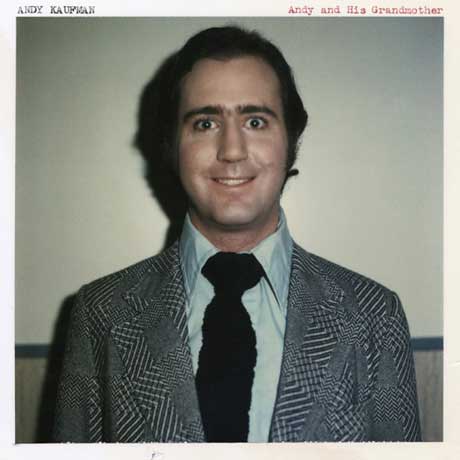It probably seemed quaint at the time, Andy Kaufman fooling around with a micro-tape recorder to capture every "slice of life" he deemed worthwhile between 1977 and 1979, and prodding each of them for some kind of insight into the human condition. As much as Kaufman was a dangerous anarchist who would betray his fans, fellow performers, and family just to provoke (often uncomfortable) reactions, he was also a populist with tremendous empathy. And, in many respects, he was a total visionary.
Kaufman was so hyper-obsessed with inauthenticity in everyday life, there is still a plausible argument that he may have planned and faked his own death almost 30 years ago. It's the ultimate example of his fervent dedication to his craft, which led him to take bits, characters and pranks into places that blurred reality and theatre and almost always found audiences shifting from appreciation to horror and various stops on the spectrum in between.
Kaufman loved his audience often by openly loathing them and their aversion for where he needed to take them. And, even if the risk didn't always pay off, he walked around like it did or that the results were ultimately inconsequential to him. At least he was trying.
Culled from 82 hours of tape by writer/performer Vernon Chatman (Wonder Showzen, South Park), Andy and his Grandmother is Kaufman's first LP, a posthumous (?) collection of fascinating conversations about abortion, seemingly real disputes with authority figures, and, of course, quasi-endearing interactions between Kaufman and his put-upon sparkplug of a grandmother. There are some obvious performance art / tape collages here too that have a surreal quality to them but the most interesting moments, for those of us steeped in the way contemporary comedians communicate, feature Kaufman in "conversation."
There's so much bitter rage in the confrontations and you just know that Kaufman is conducting all of it (notably, a phone call purportedly between two of his lovers). Even the seemingly benign, familial discussions are rich with this specific tension that Kaufman was eerily able to draw out of the air, just by pushing the right buttons. It's the real stuff — the dark, unspoken dynamic that we sometimes share with each other — that Kaufman experiments with like a mad scientist and exploits with the fearless energy of an artist whose aesthetic is based in pretension and distortion.
It's not pleasant, nor often even obviously funny, but in this golden age of over-sharing comedians and therapy-as-podcasts, Andy Kaufman and his Grandmother feels very 2013. In his quest for comedic and artistic transcendence, Kaufman's intense pursuit of the "real" was, at the very least, unwittingly timeless.
(Drag City)Kaufman was so hyper-obsessed with inauthenticity in everyday life, there is still a plausible argument that he may have planned and faked his own death almost 30 years ago. It's the ultimate example of his fervent dedication to his craft, which led him to take bits, characters and pranks into places that blurred reality and theatre and almost always found audiences shifting from appreciation to horror and various stops on the spectrum in between.
Kaufman loved his audience often by openly loathing them and their aversion for where he needed to take them. And, even if the risk didn't always pay off, he walked around like it did or that the results were ultimately inconsequential to him. At least he was trying.
Culled from 82 hours of tape by writer/performer Vernon Chatman (Wonder Showzen, South Park), Andy and his Grandmother is Kaufman's first LP, a posthumous (?) collection of fascinating conversations about abortion, seemingly real disputes with authority figures, and, of course, quasi-endearing interactions between Kaufman and his put-upon sparkplug of a grandmother. There are some obvious performance art / tape collages here too that have a surreal quality to them but the most interesting moments, for those of us steeped in the way contemporary comedians communicate, feature Kaufman in "conversation."
There's so much bitter rage in the confrontations and you just know that Kaufman is conducting all of it (notably, a phone call purportedly between two of his lovers). Even the seemingly benign, familial discussions are rich with this specific tension that Kaufman was eerily able to draw out of the air, just by pushing the right buttons. It's the real stuff — the dark, unspoken dynamic that we sometimes share with each other — that Kaufman experiments with like a mad scientist and exploits with the fearless energy of an artist whose aesthetic is based in pretension and distortion.
It's not pleasant, nor often even obviously funny, but in this golden age of over-sharing comedians and therapy-as-podcasts, Andy Kaufman and his Grandmother feels very 2013. In his quest for comedic and artistic transcendence, Kaufman's intense pursuit of the "real" was, at the very least, unwittingly timeless.
